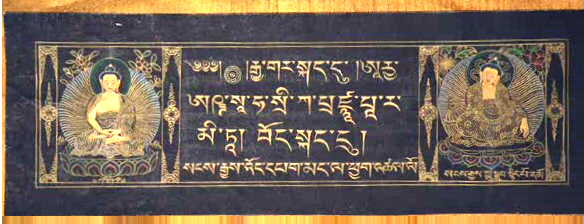The Perfection of Wisdom in 8,000 Lines (RiBa)
THE PERFECTION OF WISDOM IN 8,000 LINES (RiBa)
A humble re-vision of the wonderful achievement of the late Dr. Edward Conze...now of the 21st Century.
(roo1177@gmail.com)
A Note from Richard Babcock: This ‘Re-Visioning’ of Dr. Conze's work is of the complete 32 Chapters in prose, which were compiled in his 1973 Edition titled, The Perfection of Wisdom in 8,000 Lines & Its Verse Summary. There were 32 versified Chapters in the same book, which I have Re-Vised as well, but chose to not include them here along with this prosaical rendering, solely in the interests of clarity and what's hoped to be an easing of understanding. The several verse references [numbers in squared brackets] are consistent with the mentioned versified version, and some works by other authors as well. (see The Perfection of Wisdom; by R. C. Jamieson, published in 2000 by Viking Studio, a member of Penguin Putnam Inc.)
The term Prajnaparamita alone never refers to a specific text, but always to the class of literature.
Brief History
The earliest sutra in this class is the Astasāhasrikā Prajñāpāramitā Sūtra or "Perfection of Wisdom in 8,000 Lines", which was probably put in writing about 100 BCE. More material was gradually compiled over the next two centuries. As well as the sutra itself there is a summary in verse, the Ratnagunasamcaya Gāthā, which some believe to be slightly older as because it is not written in standard literary Sanskrit. This 8,000-line version is one of the earliest Mahayana sutras.
Between 100 and 300 CE this text was expanded into large versions in 10,000, 18,000, 25,000 and 100,000 lines, collectively known as the "Large Perfection of Wisdom". These differ mainly in the extent to which the many lists are either abbreviated or written out in full; the rest of the text is mostly unchanged between the different versions. Since the large versions proved to be unwieldy they were later summarized into shorter versions, produced from 300 to 500 CE. The shorter versions include the Heart Sutra (Prajñāpāramitā Hrdaya Sūtra) and the Diamond Sutra (Prajñāpāramitā Vajracchedikā Sūtra). These two are widely popular and have had a great influence on the development of Mahayana Buddhism. Tantric versions of the Prajnaparamita literature were produced from the year 500 CE on. --Richard 10:27, 30 May 2010 (UTC)
Table of Contents
- Chapter I — The Practice of the Knowledge of All Modes (RiBa);
- Chapter II — Sakra (RiBa);
- Chapter III — Reverence for the Receptacle of the Perfections, which holds Immeasurable Good Qualities (RiBa);
- Chapter IV — The Proclamation of Qualities (RiBa);
- Chapter V — The Revolution of Merit (RiBa);
- Chapter VI — Dedication and Jubilation (RiBa);
- Chapter VII — Hell (RiBa);
- Chapter VIII — Purity (RiBa);
- Chapter IX — Praise (RiBa);
- Chapter X — Proclamation of the Qualities of Bearing in Mind (RiBa);
- Chapter XI — Mara's Deeds (RiBa);
- Chapter XII — Showing the World (RiBa);
- Chapter XIII — Unthinkable (RiBa);
- Chapter XIV — Similes (RiBa);
- Chapter XV — Gods (RiBa);
- Chapter XVI — Suchness (RiBa);
- ChapterXVII — Attributes, Tokens, and Signs of Irreversibility (RiBa);
- Chapter XVIII — Emptiness (RiBa);
- Chapter XIX — The Goddess of the Ganges (RiBa);
- Chapter XX — Discussion of Skill in Means (RiBa);
- Chapter XXI — (More of) Mara's Deeds (RiBa);
- Chapter XXII — The Good Friends (RiBa);
- Chapter XXIII — Sakra (RiBa);
- Chapter XXIV — Conceit (RiBa);
- Chapter XXV — Training (RiBa);
- Chapter XXVI — Like Illusion (RiBa);
- Chapter XXVII — The Core (RiBa);
- Chapter XXVIII — Avakirnakusuma (RiBa);
- Chapter XXIX — Approaches (RiBa);
- Chapter XXX — Sadaprarudita (RiBa);
- Chapter XXXI — Dharmodgata (RiBa);
- Chapter XXXII — Entrusting (RiBa)
--from The Path to Bliss by H.H. the Dalai Lama, ISBN 1-55939-190-1, translated by Geshe Thupten Jinpa, edited by Christine Cox, published by Snow Lion Publications:
"...the benefit from particular spiritual guides or teachers depends upon the recipient having karmic links with these beings. Thus, some spiritual teachers can be most effective and beneficial to only a certain number of disciples, and not to other beings. In order to understand this, it is helpful to read the sutras, such as The Perfection of Wisdom in Eight Thousand Lines, in which the buddhas and bodhisattvas, having seen that a certain practitioner had a stronger karmic link with another spiritual teacher, advised him to seek his own spiritual master. There will be sentient beings who may be able to see a buddha directly, but who may not benefit as much from that as they would from interaction with you, due to their having a deeper karmic link with you.
"...Although your achievement of the omniscient state may not be beneficial to all living beings, it will definitely bring a lot of practical benefit to certain living beings. Therefore, it is very important that you work for your own achievement of the completely enlightened state. Because there might be living beings who depend very much upon your guidance on the spiritual path, it is important that you take upon yourself the responsibility to work for the benefit of others. By thinking in such terms, you will be able to develop the strong belief that without attaining the omniscient state you will not be able to fulfill what you set out to do and truly benefit others."
